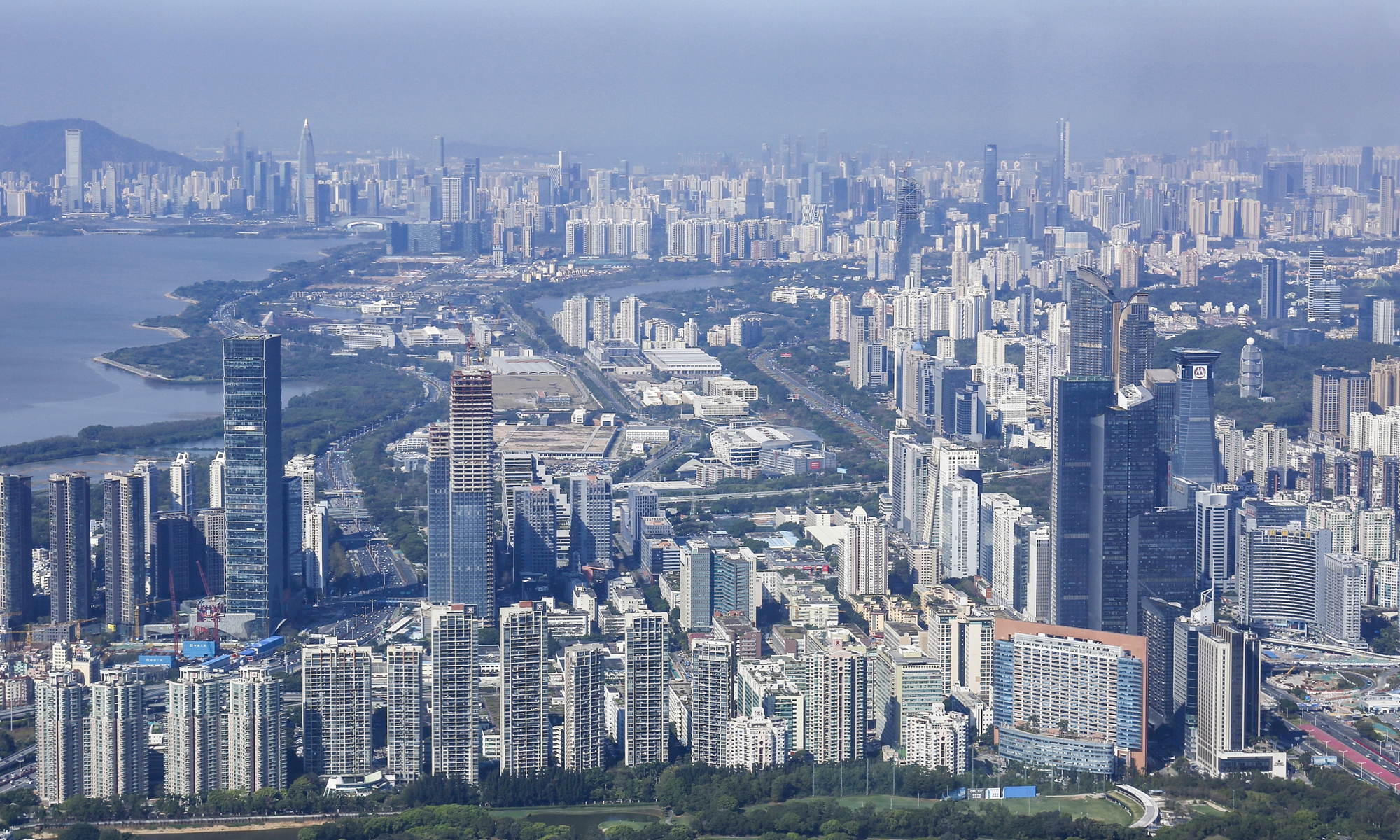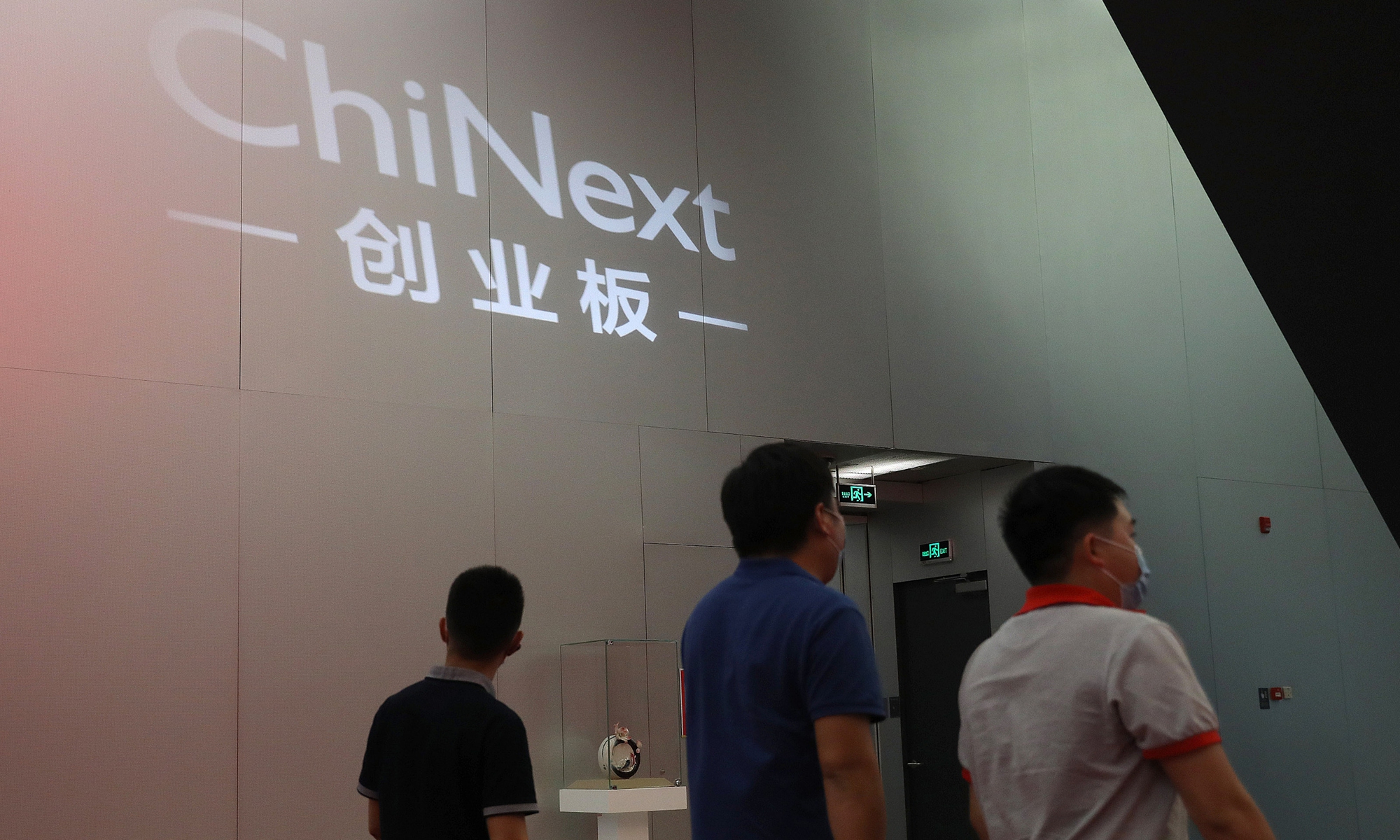Landmark startup board launched with new rules
Major opening-up move to support tech rise, help cope with US decoupling: analyst

Shenzhen. Photo: VCG
Days before China's tech hub Shenzhen is set to celebrate 40th anniversary of becoming a special economic zone (SEZ), China on Monday sounded bugle for landmark market-orientated reform for the city's tech startup board, the ChiNext board, by adopting new listing rules that are more accommodative to growing companies.
Chinese economists said the move highlighted the country's unwavering commitment to open up and reform, despite the complexities of US crackdown and internal economic challenges.
While the reform, which was widely cheered by investors on Monday, was in line with China's long-standing goal of improving its capital market - a crucial area for China's overall economic and technological rise, its launch had fresh meaning, as the new board will not only offer a fast track for Chinese tech firms but also help the country in beating back relentless crackdowns by an erratic US administration, analysts noted on Monday.
Still, the new reform to the capital market was just a part of a much broader, more profound campaign pushed by top Chinese officials in recent days across key economic powerhouses in the country from the Yangtze River Delta to the Guangdong-Hong Kong-Macao Greater Bay area to accelerate an ongoing process of industrial upgrade in pursuit of innovation-driven, high-quality growth, amid rising internal and external risks and challenges, analyst remarked.

Photo: CFP
Confidence for opening-up
This week, China will display to the world its confidence and resolution for opening-up with a set of measures, including welcoming the listing of 18 tech stocks on the ChiNext board under new IPO rules, as well as celebrating the 40-year-old birthday of the Shenzhen SEZ.
The measures are rolled out at a time when China is facing economic challenges as a result of the coronavirus epidemic, as well as intensified sanctions from the US government as the latter tried to beat down China's rising economic competence.
On Monday morning, the first batch of 18 mainland enterprises went public on the ChiNext board under registration-based IPO reforms, marking a new start for the 11-year-old Shenzhen-based tech board which is sometimes deemed the Chinese version of NASDAQ.
The reform marks groundbreaking changes for the board, in that companies hoping to get listed on the exchange no longer need to get approval from the regulators. It also largely eased profitability requirements for IPO on the board.
Investors welcomed the reform with passionate trading, which pushed all of the above-mentioned 18 stocks flying higher and sent some of them even to trading suspension twice during the day.
One of them, the Hebei-based medical diagnosis company Contec, once surged by nearly 30 times and secured a 1,061 percent hike at the end of the afternoon trading session, setting a new record for first-day jump on the country's A-share markets. In general, the ChiNext board surged by 1.98 percent to 2684.63 percent by close time.
According to Chinese economists, the registration-based IPO reforms on the ChiNext board supported China's industrial upgrade by making it easier for domestic emerging tech startups to raise funds on the capital markets to support their businesses, thus helping the country shake off technological reliance on Western countries and push technological advances.
"With the support from national policies and capital market, large numbers of high-tech firms are expected to spring up like bamboos in China after three to five years and relatively integrated industrial chains with core technologies may emerge in the country," Cao Heping, a professor of economics at Peking University, told the Global Times on Monday.
Pushing reforms
Instead of being weighed down by pressure from the raging pandemic or the US government, China's pace of opening-up has been speeding up recently, with reform measures ranging from channeling overseas capital into the domestic stock markets to launching regional development strategies in certain parts of the country to speed up economic growth.
And much more moves make their mark on the economic strength of China and its star cities. The Shenzhen SEZ, which will celebrate its 40-year birthday on Wednesday, is such an example. The city, one of the first four special economic zones China set up in the beginning of its reform and opening-up, has transformed from a fishing village to global metropolis with trillions of GDP volume with the help of decades-long reforms, including those on capital markets like the aforementioned changes on IPO rules and rollout of policies to boost high-tech industries.
Meanwhile, the government is also pushing economic development and technological upgrade with regional policies, such as integrating Hong Kong, Macao and Guangdong into a world-class city cluster via the Greater Bay Area initiative. It also rolled out a development plan for the country's top economic powerhouse, the Yangtze River Delta, by integrating Shanghai and the three neighboring provinces of Jiangsu, Zhejiang and Anhui.
Economists said that such resolute push for market reforms and economic opening-up will help China to "push back" US-initiated economic and tech decoupling with China and accelerate technological advance on its own.
"The two-year trade war the US initiated against China has made China realize that it couldn't rely on imports of key equipment and core technologies any more. Hence, the country will surely ramp up its efforts to make key breakthroughs in bottleneck technologies such as semiconductors and high-end manufacturing," said Cong Yi, a professor at the Tianjin University of Finance and Economics on Monday.
According to Cong, the more the US advocates anti-globalization and protectionism, the more open and globalized China will become, adding that China's huge consumption and innovation potential would attract further foreign investment and eventually make the US' ulterior purpose fail.
Cao also said that China's manufacturing industry has been in the lower and middle-end of global industrial chain over the past 40 years, throwing domestic enterprises - such as Huawei and ZTE - in a disadvantageous position once developed economies conspire to encircle China's high-tech development.
But this situation will change, after those companies benefit from policy support such as being able to raise more funds from the capital markets to back business expansion. "This benefits their technological innovation and the city's high-tech development, and China won't be afraid of US crackdown then," he noted.



